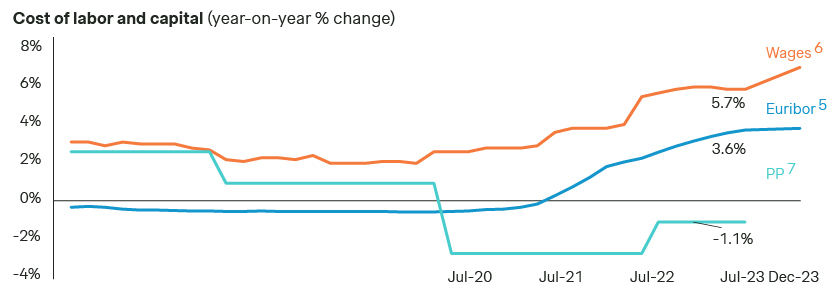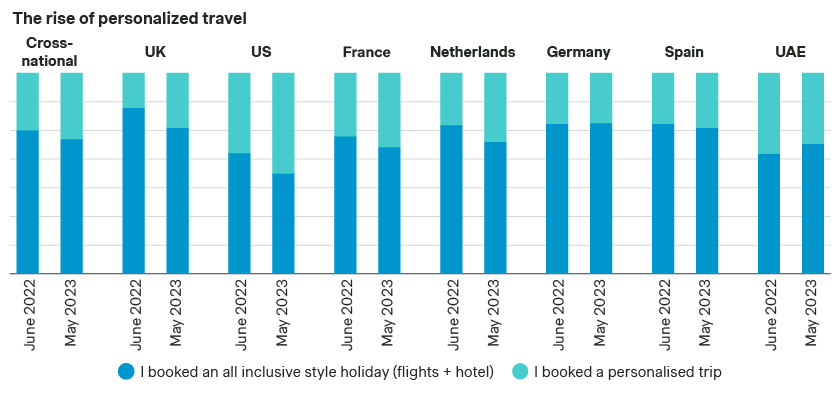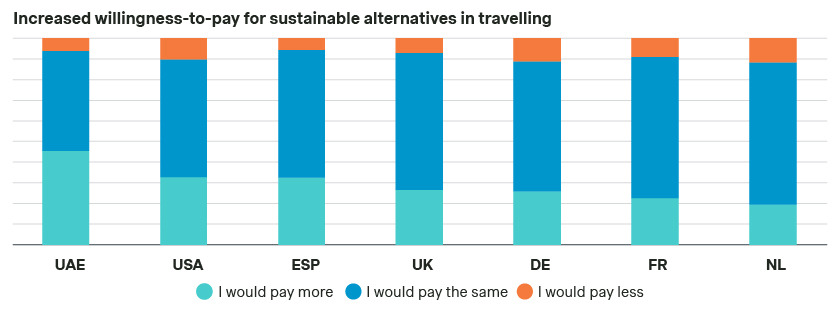As we enter the new year, the leisure, travel, and tourism (LTT) industries face both uncertainties and opportunities. In this article, we discuss three pivotal pillars that will shape success in the sector for the foreseeable future.
Pillar 1: Safeguarding margins through smart pricing strategies
In 2024, the industry will encounter a significant challenge as labor costs continue to rise, for instance, due to the activation of renegotiated collective bargaining agreements (CAO). For example, in the Netherlands, the hospitality-CAO announced an 8 to 10% increase in salaries, and the rail-CAO anticipates a 6.25% rise for their members.
The high increase in labor costs demands businesses across the sector to implement intelligent and effective pricing strategies, especially given that the last two years have also seen significant increases in pay. Across the industry, the implementation of well-considered price increases transcends mere necessity; it emerges as a vital component for sustaining operations and ensuring long-term profitability.

To cope with this challenge, companies in the LTT industry can safeguard their margins through smart pricing strategies. Several key actions stand out as particularly effective in navigating this landscape.
1.1 Dynamic pricing
As companies in the industry respond to the challenge of rising labor costs in 2024, embracing dynamic pricing emerges as a key strategy. Uber, a prominent player in the sector, exemplifies this approach by utilizing real-time adjustments based on factors such as demand, traffic conditions, and other pertinent variables. This flexibility allows Uber to optimize pricing strategies, ensuring a balance between competitiveness and revenue maximization, particularly during peak periods when demand surges. For the leisure and travel industry, adopting dynamic pricing models becomes instrumental in navigating the landscape marked by above-average wage cost increases, contributing to sustained profitability.
1.2 Value-based pricing approach
Furthermore, adopting a value-based pricing approach remains crucial for differentiation in the competitive market. Aligning prices with the perceived value of services enables companies not only to reflect the quality of their offerings but also to set themselves apart. We recently worked with a renowned European concert hall that implemented a new price strategy increasing the level of differentiation and bringing their offering more in line with the value their customers perceive. As a result, they were able to successfully realize double digit revenue growth and thereby ensure a healthy margin. Furthermore, we are also seeing businesses introduce more personalized pricing strategies, where businesses tailor prices to individual customer segments based on preferences and purchasing patterns, fostering loyalty, and encouraging repeat business.

1.3 Bundled offerings
In the face of above-average wage cost increases, the implementation and refinement of bundled offerings emerges as a resilient strategy for sustained profitability. This tactic not only elevates the overall customer experience but also enables businesses to maintain and potentially boost revenue levels. By tailoring bundled services or experiences to the evolving needs of travelers, companies can enhance the attractiveness of their packages.
Marriott, a key player in hospitality, exemplifies this approach by providing comprehensive packages that include accommodation, dining credits, and additional services. Emulating industry leaders like Marriott allows businesses to foster loyalty, creating a sense of value and affinity among customers.
Pillar 2: Being prepared for uncertainty in 2024
Looking ahead to 2024, the LTT industry faces a year marked by uncertainty. While consumers may cut down on expenses in 2024 on non-essential leisure activities due to lower spending capacity, the essence of "leisure" endures, with vacations and daytrips retaining their significance. Unemployment remains low, indicating continued need for holidays. Thus, the key question is: How can companies navigate this delicate balance of reduced spending and sustained consumer engagement? Three topics stand out to consider when answering this question.
2.1 Sustaining loyalty and retention
Anticipating a scenario where consumers may indulge in leisure activities less frequently, maintaining brand loyalty becomes paramount. Even with fewer days out, it's crucial to ensure that your brand is the preferred choice when consumers decide to engage in a leisure activity. Marketing strategies should focus on personalized experiences and loyalty programs that resonate with consumers, making your brand a top-of-mind choice for their occasional leisure pursuits.
2.2 Agility in response to uncertainty
Agility is the watchword in an uncertain landscape. Travel agencies, for instance, need the capability to swiftly adapt to changing consumer preferences and geopolitical conflicts. The ability to seamlessly transition offerings such as travel packages from the Middle East to Southern Spain becomes a strategic imperative. Similarly, fast casual dining restaurants like Happy Italy, Wagamama and Vapiano’s should be agile in catering to evolving consumer behaviors responding adeptly to the trend of "down-trading", in which consumers shift to more affordable dining options without compromising perceived quality.
2.3 Providing certainty in consumer spending
In an environment where uncertainty looms, providing consumers with certainty in their spending becomes a competitive advantage. Understanding the demand for predictability, travel agencies can explore the popularity of 3-star all-inclusive packages, offering consumers a clear understanding of their vacation costs. Simultaneously, catering to price-sensitive consumers by providing basic packages with the option to add extras at a margin ensures flexibility and aligns with evolving spending preferences.
In conclusion, as the industry braces for the uncertainties of 2024, addressing these key topics—sustaining loyalty, embracing agility, and providing spending certainty—will be integral to thriving in a landscape marked by fluctuating consumer behaviors and economic dynamics.
Pillar 3: Futureproofing for 2025 and beyond
As the travel industry looks ahead to 2025 and beyond, companies are actively future-proofing their operations. This involves a dual focus on seamlessly integrating artificial intelligence (AI) for enhanced efficiency and personalized experiences, alongside a commitment to sustainability that aligns with the rising environmental consciousness among travelers. In this evolving landscape, the strategic incorporation of AI and sustainability practices emerges as a pivotal strategy for long-term success in the LTT sector.
3.1 AI Integration
The LTT sector is witnessing a significant transformation through the practical incorporation of artificial intelligence (AI), as demonstrated by industry leaders like Expedia, Airbnb, and Delta Air Lines.
Expedia, a prominent online travel agency, has implemented Smart Chatbots and Virtual Assistants to streamline customer interactions, offering real-time assistance and personalized recommendations. This strategic use of AI enhances operational efficiency and aligns with the growing demand for user-friendly travel platforms.
Similarly, Airbnb utilizes AI for Predictive Analytics in Demand Forecasting, allowing hosts to dynamically adjust pricing based on historical booking data and market trends. This approach enables hosts to optimize rates in response to anticipated demand, showcasing the adaptability that AI brings to the market. This not only benefits hosts by maximizing revenue during peak seasons but also contributes to a more competitive landscape within the travel accommodation sector.
Delta Air Lines has embraced AI through Facial Recognition and Biometrics, streamlining security procedures and boarding processes at various airports. This practical application of AI enhances efficiency and aligns with the industry's push towards contactless solutions.
The examples of Expedia, Airbnb, and Delta underscore the tangible benefits of AI in improving customer experiences, optimizing operations, and fostering innovation within the leisure travel industry.
3.2 Sustainability
Consumers are demanding more sustainable travel. For example, in our Travel Trends study conducted in 2023, we saw an increasing number of people preferring to take the train over travelling by plane. Furthermore, we see an increasing willingness-to-pay for more sustainable options for both accommodation and transportation.

In the pursuit of sustainability within the travel sector, companies are strategically reshaping their business models around three pivotal pillars. First, the adoption of Green Practices is exemplified by EcoCamp Patagonia, an eco-friendly accommodation in Chile's Torres del Paine National Park. With green building techniques, renewable energy use, and robust waste management, EcoCamp Patagonia aligns with eco-conscious traveler preferences, showcasing the concrete benefits of integrating sustainability into business operations (EcoCamp Patagonia).
In the airline business we see companies like Air France-KLM taking a leadership role in Carbon Offsetting and Reduction, committing to sustainable aviation and carbon offset initiatives. This proactive approach signifies a dedication to reducing the carbon footprint associated with air travel and sets a precedent for the industry, emphasizing the significance of offset initiatives. Furthermore, Lufthansa has introduced Green Fares, offering more sustainable air travel options. These fares reduce individual flight-related CO₂ emissions using sustainable aviation fuels and offset the remaining emissions through contributions to climate protection projects (Air France-KLM, Lufthansa).
Additionally, the transition to Renewable Energy Sources is evident in TUI Group's investment in sustainable operations, notably demonstrated by TUI Cruises' introduction of the world's first hybrid cruise ship powered by liquefied natural gas (LNG) and battery technology. This move reflects a commitment to reducing reliance on traditional energy sources, aligning with broader sustainability goals and positioning TUI Group as a pioneer in sustainable tourism (TUI Group).
These examples underscore how companies can integrate sustainability into their LTT business models, contributing to a more responsible and resilient future for the industry.
4. Conclusion
In conclusion, as we embark on the journey of 2024, the leisure, travel and tourism industry stand at the crossroads of change and innovation. By safeguarding margins, navigating uncertainties, and futureproofing through AI and sustainability, businesses can pave the way for sustained success in the years to come. Now is the time to chart a course toward excellence in the ever-evolving landscape of travel.
Ready to chart a course to success in the ever-evolving travel industry? For personalized insights and expert guidance, reach out to our seasoned industry experts at Simon-Kucher. Connect with Jos Eeland or Nout van Zon to navigate challenges, optimize pricing strategies, and future-proof your business. Don't miss the opportunity to stay ahead in 2024 and beyond. Contact us today for a consultation tailored to elevate your position in the Leisure, Travel, and Tourism sector.
We wish to thank Ranice Janssen (Senior Consultant) for her contribution as a co-author to this article.

